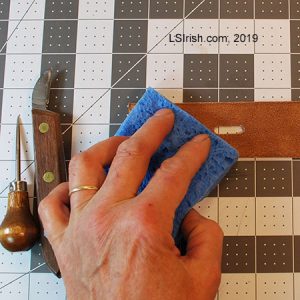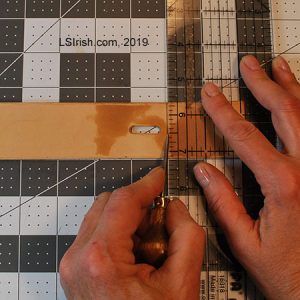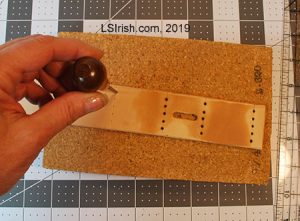 Step 13: Dampening the Leather
Step 13: Dampening the Leather
Heavy weight leathers may need to be lightly dampened with water to fold the leather at the buckle latch bar easily. Avoid soaking the leather in water. This can cause the leather to stain and develop a watermark line where it was drenched.
Dampen your sponge with water, wring out as much water as possible, and then lightly pat the sponge across the raw hide side of the leather. Gently fold the leather to the back of the belt blank to set the center fold line at the buckle slot.
 Step 14:Creating a Score Line with an Awl
Step 14:Creating a Score Line with an Awl
Open the folded end and align a transparent quilting ruler on the front side of the leather belt. Create one indent line about 3/8” (10mm) from each the side of the buckle slot. Create a second indent line on both sides of the buckle slot 1 ½” (38mm) to 1 ¾” (44.5mm) from the slot edge.
With the ruler still in place along the indented guidelines, hold your awl upright to the leather and lightly push the awl into the leather to create shallow stitch guide marks at 3/16” (5mm) to ¼” (6mm) intervals along the line. Use the interval measurement that best fits the width of your belt and the leather weight of the blank. Light weight leathers, 4 to 6 ounce, take a stitching interval around 3/16” (5mm) apart. Heavier weight leather, 6 ounces and up, takes a stitching interval of ¼” (6mm).
 Step 15: Creating the Stitching Holes
Step 15: Creating the Stitching Holes
Lay your belt on a thick cork board or poly board. Hold the awl upright to the leather with the point set into the guide holes. Push the awl into the leather to create your stitching holes.